Meet Zahra, the Hand in Hand trainer fighting Covid-19
When Zahra started working for Hand in Hand six months ago, the 25-year-old thought she’d be training women to run their own micro-businesses, helping them thrive in the long term. Now, as the country braces for a Covid-19 crisis some experts fear could be globally significant, Hand in Hand’s youngest trainer finds herself fighting for their short-term survival instead.
“It’s a very heavy responsibility and we feel a sense of fear. If someone has the virus, it’s difficult to control it,” says Zahra. “On the other hand, it’s a pleasure to help our people, who are really in need and live in poverty.”
Across Hand in Hand Afghanistan the story is the same, as the entire organisation retools – seemingly overnight – to respond to the threat of the virus. Between thousands of members living in hard-to-reach areas, deep bonds with local officials, and a senior management team with decades of humanitarian experience, Hand in Hand Afghanistan is uniquely well-suited to help. So when a government lockdown caused the suspension of our usual training on 30 March, we were ready to adapt and keep fighting.
Phase One of Hand in Hand Afghanistan’s Covid-19 Emergency Response kicks into gear on 5 April, as teams fan out across Parwan, Balkh and Herat Provinces delivering soap, chlorine solution and virus prevention training to some 26,000 people. Fundraising for Phase 2, where we hope to at least double that number, is underway now.
“We consider it our duty to inform people about methods of prevention. We can save lives,” says Zahra. “I had dozens of members who weren’t aware about the coronavirus and how to reduce the risk of infection until I told them.”
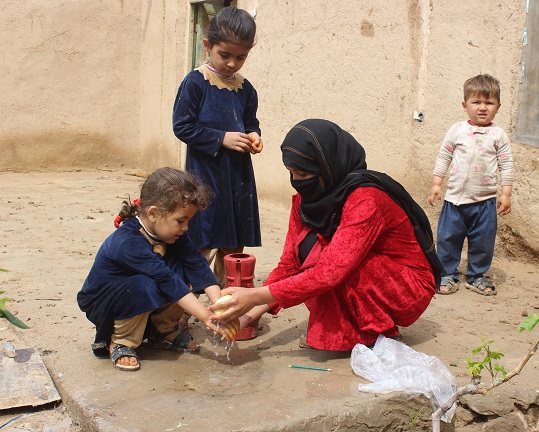
Handwashing time for Sharifa and family.
Sharifa, 24, was one of them.
“Zahra told us about coronavirus and how dangerous it is,” says the mother of four young children. “She gave me and other women health instructions such as not to go to crowded places; to wash our hands repeatedly with soap many times throughout the day; to use a mask and gloves, which we have for our poultry farm, if we go out in public; and to cover our mouths with a cloth when we sneeze.”
With no health services in the area, Zahra worries that Hand in Hand’s is the only help Sharifa and thousands more like her will get. “And even if they can make it to the public hospital in Mazar, we know their capacity is very low. They don’t have the equipment to cope,” she says.
One day, Covid-19 will pass – a global health crisis leaving a global economic crisis in its wake. When that day comes, Hand in Hand will be ready to help our members work their own way out of poverty, the same we have since Day One. Until then, we’re fighting Covid-19 with everything we’ve got.
“The second thing I worry about right now is the financial aspect,” says Sharifa. “The first thing is our health.”
By the numbers
4,000 households reached
26,000 Afghans provided with soap and chlorine solution
20 minutes of virus prevention training per household
Chris, training slum dwellers in business
Local hero
Like many of his colleagues at Hand in Hand, Chris studied co-operative management. Two years into his job and responsible for coaching around 400 Hand in Hand group members, he clearly enjoys it: “Working with the community is the best thing I have ever done.”
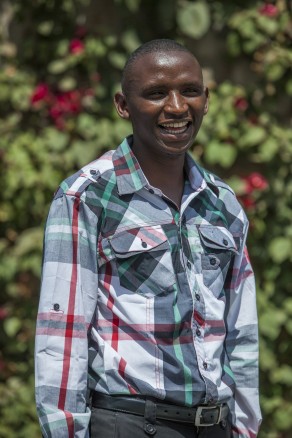 A former Scout leader, he has always volunteered in community projects and was keen to continue with social work. “I meet different people – some are rude, some are good, some are kind. I feel that now I can speak to anyone and make a difference.” The most challenging part of his work? “I am out in every weather, visiting up to four groups a day and following up with individuals, in the heat, the cold or the rain.”
A former Scout leader, he has always volunteered in community projects and was keen to continue with social work. “I meet different people – some are rude, some are good, some are kind. I feel that now I can speak to anyone and make a difference.” The most challenging part of his work? “I am out in every weather, visiting up to four groups a day and following up with individuals, in the heat, the cold or the rain.”
Some people are harder to train in financial literacy and business skills than others. “I have some clients who may not even have been to primary school. At first they only know about waking up, looking for food for the day, and that’s their life, so it can be difficult to get through to them.”
But in most cases, he feels he is making a tangible difference. “I was able to teach the groups about financial discipline. They may know how to use numbers, but not how to figure out how much they can afford. They are so used to just thinking about making enough to eat that day. Now they understand the point of having at least a small reserve for an emergency,” says Chris.
‘A good teacher’
Irene Wanjiku, one of Chris’s trainees, says about him: “I had a business before but it was Chris who advised us to move away from our old shop because the rent was just too high. And he was right, in the new shop we will pay so much less rent. He is a good teacher. ” Thanks to Chris’s intervention, Irene’s monthly income will increase from 5,500 to 9,000 Kenyan Shillings (around US $105) a month.
“Working with the community is the best thing I have ever done”
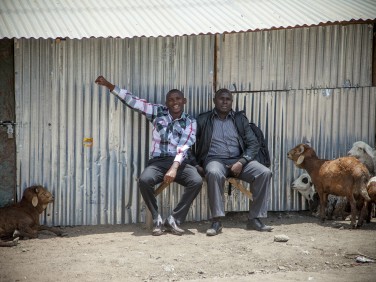
Chris has found working with Irene and her group really inspiring: “The moment I met them, I admired how they survive. They taught me that by being a hard worker you can do anything. They don’t have an education, they don’t have a job, yet they are very creative, they have ideas for a business, they believe they can make it. It’s all about determination – they know what they want. People around them might do drugs, or give up.
“The moment I feel like giving up, I think of them. If they are making it, then who am I to give up? It really motivates me.”
Meet Palwasha, the trainer who returned home
Hand in Hand Afghanistan entrepreneurs aren’t the only ones making a difference. Across the country, in a growing number of provinces, trainers are too.
Take Palwasha Rafiqzada (pictured above, left). In less than a year, the vocational trainer has instructed 154 women in five different villages on skills as varied as poultry rearing and knitting. It’s a small contribution to the thousands of jobs created by Hand in Hand Afghanistan, but one that Palwasha finds hugely fulfilling all the same. “I’m proud to work with poor people toward a change,” says the 41-year-old.
An uphill battle
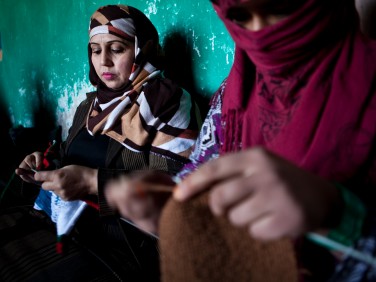 She isn’t exaggerating. After 35-plus years of near-continuous conflict, Afghanistan is the tenth poorest country in the world, with a child mortality rate of 99/1,000, the highest outside sub-Saharan Africa, and a maternal mortality rate of 460/100,000, the second-highest outside sub-Saharan Africa.
She isn’t exaggerating. After 35-plus years of near-continuous conflict, Afghanistan is the tenth poorest country in the world, with a child mortality rate of 99/1,000, the highest outside sub-Saharan Africa, and a maternal mortality rate of 460/100,000, the second-highest outside sub-Saharan Africa.
Like so many others at Hand in Hand Afghanistan – from fellow vocational trainers to CEO Abdul Rahim Nasry – Palwasha knows our members’ struggle first-hand. In the late-1990s, as conflict spread into north Afghanistan, the mother of six was forced to abandon a career in education and seek refuge in Pakistan. It was there, in a crowded immigration camp, that the graduate of Sayed Jamaluddin Afghan University learned how to sew, knit and rear poultry – skills she still teaches today.
“I’m proud to work with poor people toward a change”
Motivation
Hand in Hand hires local field staff exclusively. Beyond suiting our ethos of self-reliance – and helping keep expenditures low – the practice means trainers are invested in their work.
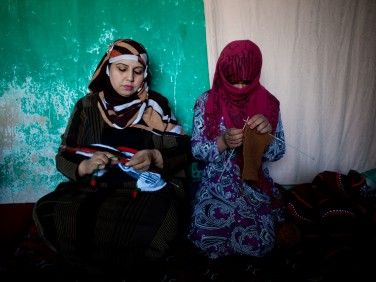
Palwasha returned to Balkh Province after the Taliban fell in 2001. Her husband found work as a doctor’s assistant. She found work with several NGOs, including a stint as poultry team supervisor at the UN’s Food and Agriculture Organization, before joining Hand in Hand more than a decade later in May 2013.
It’s work she has every intention of continuing. “The people I work with face many problems – poverty, a lack of education, inadequate life skills – but by the time they graduate I find them strong and enabled,” says Palwasha. “When they start to earn money they improve their position in the family and in society.”
Balkh Province, Afghanistan
Editor’s note: Palwasha no longer works for Hand in Hand.
